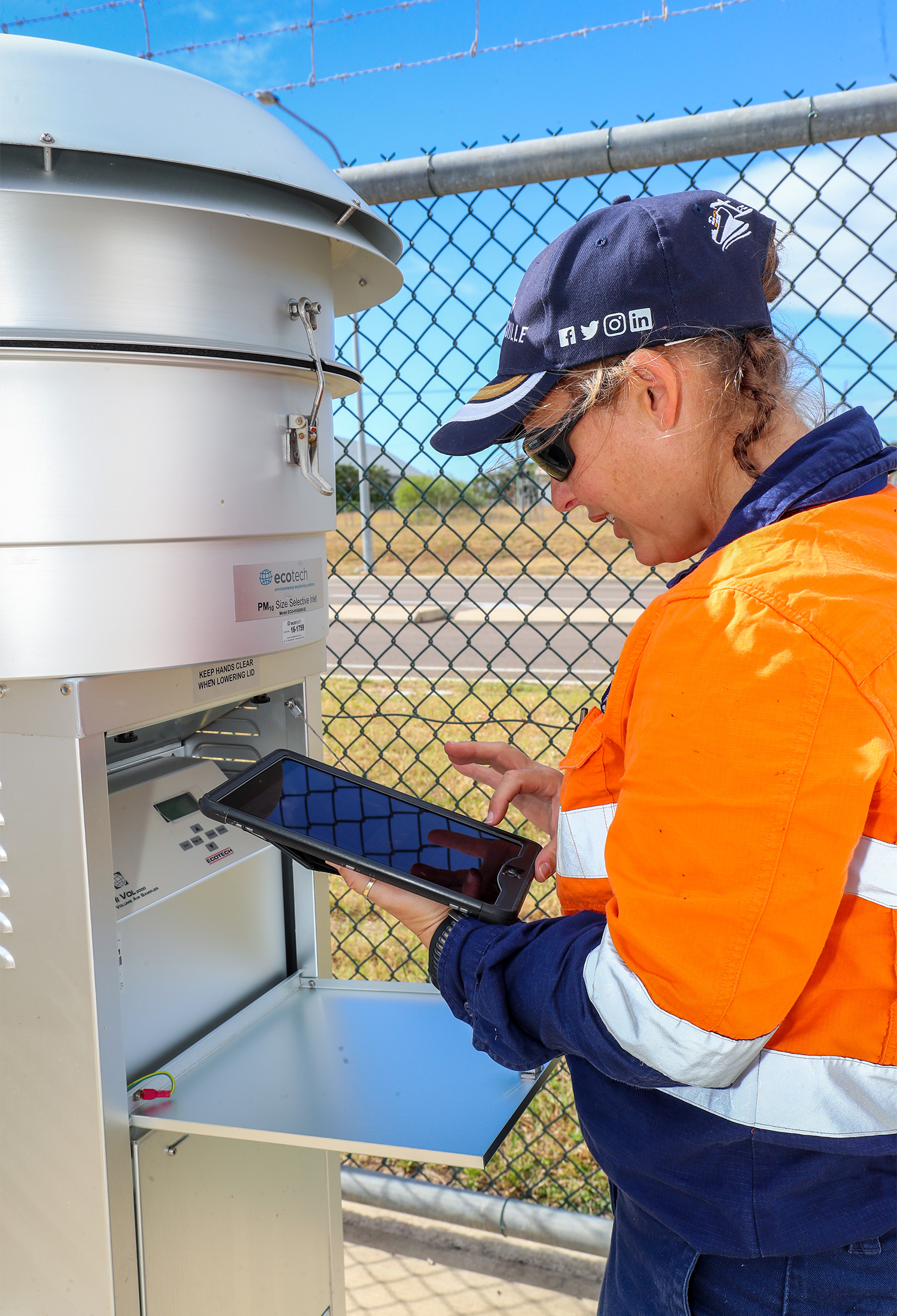More pages in this section
Page last updated on 11-03-2025.
Air Monitoring
Air emissions are complex with many inputs notably from general city operations (e.g. vehicles, construction, bushfires etc). Previous Queensland Government testing of community locations has shown that the “Townsville black dust” commonly comprises of a mixture of different particle types, including silica and silicate mineral grains, clay (soil) particles, soot (from combustion processes such as motor vehicle exhaust, particularly diesel exhaust), mould spores and smoke residue (from bushfire events). Air emissions may also be generated by the handling of some bulk materials at the Port.
The Port is very mindful of ensuring best practice standards of operations for the transport and loading of various cargoes. Loading operations have strict regulations for the handling of bulk minerals set by the Queensland Department of Environment, Tourism, Science and Innovation (DETSI) – the Model Operating Conditions (Air) for Port Customers conducting ERA 50 (1) Bulk Material Handling – Minerals.
A comprehensive range of measures are taken to minimise dust emissions generated by port activities. All bulk cargo transported into the Port of Townsville is in covered wagons on trains, or in enclosed containers on trucks. All bulk cargo is stored in fully enclosed sheds and is transported to vessels by enclosed conveyor belts or enclosed containers/trucks. During loading operations into vessels, dust suppression and dust control systems are used e.g. misting sprays or dust extraction and filtration systems.
The Port of Townsville's Boundary Air Quality Monitoring Plan has been designed to characterise air quality in the environment surrounding the port. Three air monitoring stations have been installed around the port boundary including at Coast Guard, Lennon Drive and Environmental Park. A number of Port Customers also sample air quality on their sites. DETSI also conduct an air quality monitoring program in Townsville at North Ward and Coast Guard.
The Townsville Port Air Quality Dashboard is a tool that enables the general community to view air quality monitoring data and associated information in an easy to understand format. Published monthly, the Dashboard displays results from the port boundary, as well as links to DES data and publications.
Disclaimer: Whilst Port of Townsville Limited (Port) has taken care in the preparation of all information, neither the Port, any related body corporate of the Port nor any of their officers, employees, consultants, officers, advisors or agents gives any warranty, nor makes any representations (express or implied) as to the completeness, adequacy, suitability, quality or accuracy of this information. Users of this information do so at their own risk and are responsible for ensuring that the information meets their requirements for any proposed usage.
Air Quality Monitoring Equipment

Continuous Metal Analyser
Equipment that operates continuously and measures metal concentrations using X-Ray Fluorescence methodology.

Real-Time Particulate Monitor
Equipment that operates continuously and measures particulates using either gravimetric or scattered light spectrometry.

Dust Deposition Gauge
Dust gauges comprise a jar with a glass funnel that collects any large particles from the air, that would fall on surfaces (ie. houses). Sample is collected monthly and analysed at a NATA certified laboratory.

High Volume Air Sampler
This equipment draws in and collects any air particles on sampling paper over a 24 hour period every 6 days (i.e. 60-61 samples a year). Sample is collected and analysed at a NATA certified laboratory
Two different size heads (i.e. sample inlets) give different information.
PM10 inlet collects only material that is less than 10 microns in diameter, these particles are inhalable.
TSP (total suspended particles) collects material in the air less than 100 microns in diameter suspended in the air.
[feature-block]
You can read a comprehensive list of frequently asked questions that was compiled by the Port Stakeholder Working Group.
Need further information or want to report something you are concerned about?
Contact the Port of Townsville's Climate and Environment team:
p 07 4781 1500
e Environment@townsvilleport.com.au
[/feature-block]


